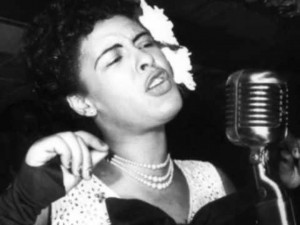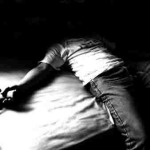Billie Holiday died in the Metropolitan Hospital, New York, on Friday, July 17, 1959, in the bed in which she had been arrested for illegal possession of narcotics a little more than a month before, as she lay mortally ill; in the room from which a police guard had been removed by court order only a few hours before her death, she was 44.
Billie Holiday Dies Here at 44; Jazz Singer Had Wide Influence
BY THE NEW YORK TIMES
July 18, 1959
Billie Holiday, famed jazz singer, died yesterday in Metropolitan Hospital. Her age was 44. The immediate cause of death was given as congestion of the lungs complicated by heart failure.
Miss Holiday had lived at 26 West Eighty-seventh Street. She had been under arrest in her hospital bed since June 12 for illegal possession of narcotics.
Miss Holiday set a pattern during her most fruitful years that has proved more influential than that of almost any other jazz singer, except the two who inspired her, Louis Armstrong and the late Bessie Smith.
Miss Holiday became a singer more from desperation than desire. She was named Eleanora Fagan after her birth in Baltimore. She was the daughter of a 13-year-old mother, Sadie Fagan, and a 15-year-old father who were married there years after she was born.
The first and major influence on her singing came when as a child she ran errands for the girls in a near-by brothel in return for the privilege of listening to recordings by Mr. Armstrong and Miss Smith.
Miss Holiday took her professional name from her father, Clarence Holiday, a guitarist who played with Fletcher Henderson’s band in the Nineteen Twenties and from one of the favorite movie actresses of her childhood, Billie Dove.
She came to New York with her mother in 1928. They eked out a precarious living for a while, partially from her mother’s employment as a housemaid. But when the depression struck, her mother was unable to find work. Miss Holiday tried to make money scrubbing floors, and when this failed she started along Seventh Avenue in Harlem one night looking for any kind of work.
At Jerry Preston’s Log Cabin, a night club, she asked for work as a dancer. She danced the only step she knew for fifteen choruses and was turned down. The pianist, taking pity on her, asked if she could sing. She brashly assured him that she could. She sang “Trav’lin’ All Alone” and then “Body and Soul” and got a job–$2 a night for six nights a week working from midnight until about 3 o’clock the next afternoon.
Recommended to Goodman
Miss Holiday had been singing in Harlem in this fashion for a year or two when she was heard by John Hammond, a jazz enthusiast, who recommended her to Benny Goodman, at that time a relatively unknown clarinet player who was the leader on occasional recording sessions.
She made her first recording, “Your Mother’s Son-in-Law” in November, 1933, singing one nervous chorus with a band that included in addition to Mr. Goodman, Jack Teagarden, Gene Krupa and Joe Sullivan.
Two years later Miss Holiday started a series of recordings with groups led by Teddy Wilson, the pianist, which established her reputation in the jazz world. On many of these recordings the accompanying musicians were members of Count Basie’s band, a group with which she felt a special affinity. She was particularly close to Mr. Basie’s tenor saxophonist, the late Lester Young.
It was Mr. Young who gave her the nickname by which she was known in jazz circles–Lady Day. She in turn created the name by which Mr. Young was identified by jazz bands, “Pres.” She was the vocalist with the Basie band for a brief time during 1937 and the next year she signed for several months with Artie Shaw’s band.
Miss Holiday came into her own as a singing star when she appeared at Cafe Society in New York in 1938 for the major part of the year. It was at Cafe Society that she introduced one of her best-known songs, “Strange Fruit,” a biting depiction of a lynching written by Lewis Allen.
During that engagement, too, she established trade-marks that followed her for many years–the swatch of gardenias in her hair, her fingers snapping lazily with the rhythm, her head cocked back at a jaunty angle as she sang.
Arrested in 1947
In 1947, a cloud that had been gathering over Miss Holiday and which was to cover the rest of her career, burst on her. She was arrested for a narcotics violation and, at her own request, was committed to a Federal rehabilitation establishment at Alderson, W. Va., for a year and a day in an attempt to rid herself of the habit.
Ten days after her release Miss Holiday gave a concert at Carnegie Hall to a packed house but, although she appeared at concert halls in New York from time to time after that, she was not allowed to appear in New York night clubs. As a result of her narcotics conviction, she could not get the necessary cabaret license.
During the Nineteen Fifties Miss Holiday’s voice began to lose its useful elasticity. This, combined with occasional brushes with narcotics agents, made her last years difficult, although she continued to record frequently.
Miss Holiday appeared in a film, “New Orleans,” in 1946 and was featured in a Broadway revue for a short run a few years later. In 1954 she made a tour of Europe and was featured in a widely acclaimed television program, “The Sound of Jazz,” in 1958.
She is survived by her husband, Louis McKay. A previous marriage, to Joe Guy, a trumpet player, ended in divorce.








